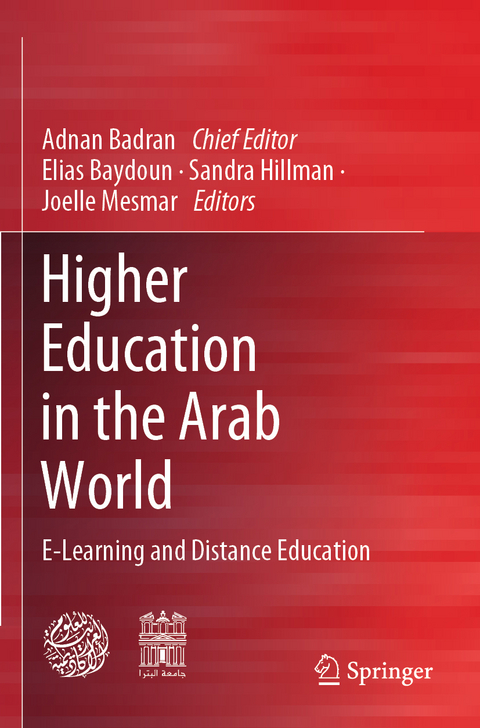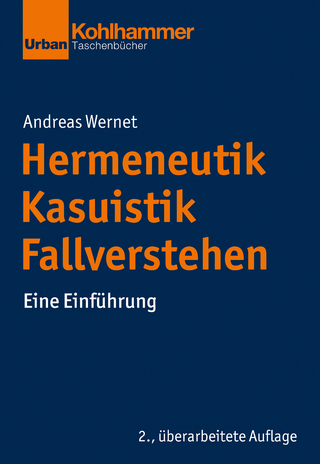
Higher Education in the Arab World
Springer International Publishing (Verlag)
978-3-031-33570-9 (ISBN)
This book provides a comprehensive insight into the benefits and advantages of adopting technology-driven learning as a central pillar of the universities' teaching, learning, research, and social-responsibility strategies. Despite the importance of adopting technology-enhanced learning within higher education institutions, Arab countries are still slow to change. Arab Universities are facing the need to adopt new methods of learning to serve the demands of a changing demography in the higher education community as well as the requirements of Industry 4.0 and Society 4.0. E-Learning and distance education are not just about technology, but they are about education, pedagogy, curriculum design, research, and innovation. The book also discusses the best methods to implement these modes of learning while taking into consideration all the hurdles and challenges specific to the Arab world. The needs of students (undergraduate and postgraduate), faculty, and the university at large are considered while drawing on the best quality-assurance practices to ensure the quality of education remains uncompromised. Also featured in this book are experiences from Arab Universities and recommendations for improvements that facilitate the use of education technology tools as part the university's pedagogy to harness the full potential for implementing e-learning and distance education.
Professor Adnan Badran the Chancellor of the University of Petra and the Chairman of the Board of Trustees of the University of Jordan. He is a biologist with over 166 papers presented, and 41 books, 54 research papers published and 4 patents. He was awarded an Honorary Doctorate from Sungkyunkwan University, Seoul (1981); an Honorary Doctorate in Science from Michigan State University, (2007); an Honorary Doctorate in Business from Yarmouk University, Jordan (2014); the West Watkins distinguished Lectureship Award (2009) USA; the Hall of Fame Alumni Award from Oklahoma State University, USA; and the Honorary Professorship from L.N. Gumilev Eurasian National University Kazakhstan (2012). Also, he was awarded the Arab Thought Foundation Award for best Arab scientist in higher education research (2005); the TWAS Regional Prize for "Building Scientific Institutions" (2009); the World Education Asia award for Outstanding Contribution to Education (2011) and the Shoman award for Peer review of young Arab scientists.
Badran was Prime Minister (2005), Minister of Agriculture (1989) and Minister of Education (1989) in Jordan. He was Senator and Chair of the Senate Committee on Science, Education and Culture (2006-2010). He also served as Deputy Director-General of UNESCO (1994-1998) and Assistant Director General for Science, Paris (1990-1994). Founding President of Yarmouk University and Jordan University of Science and Technology (1976-1986), President of Philadelphia University (1998-2005) and President of University of Petra (2007-2014), and Dean of the Faculty of Sciences at the University of Jordan (1971-1976). Secretary General (1986-1987) and Vice-president (2014- ) of the Higher Council for Science and Technology, Jordan. President of the National Centre of Human Rights, Jordan (2008-2011) and President of the Asia-Pacific Forum on Human Rights, Sidney (2009-2011). Member of the Board of Trustees of the Arab Thought Forum (2012-). He is a Fellow and former Vice-president of the Academy of Sciences for the Developing World (TWAS), Fellow of the Islamic World Academy of Sciences (IAS) and President of the Arab Academy of Sciences. Chairman of the Board of the Arab Forum for Environment and Development in Beirut (2008- ). President of the Higher Council of the National Centre for Curriculum development (2017-2019) and Chairman of Shoman Trust Fund for Research (2019- ). Member of the Board of Trustees of the King Abdullah Ibn Al Hussein Award for Innovation (2020-).
Badran received his B.Sc from Oklahoma State University (1959), and Master then PhD from Michigan State University (1963), USA.
Professor Elias Baydoun was educated at the University of Jordan, Amman (BS 1971), the American University of Beirut (AUB; MS 1977), and the University of Cambridge where he obtained his MPhil in 1978 and PhD in 1980. He is currently Professor of Biology at AUB, Secretary General of the Arab Academy of Sciences and Adjunct Professor at the University of Petra in Jordan. Previous positions included: Chairman of Biology (1978-93) and Associate Professor at AUB; Associate Professor, Assistant President (1983-86), Director of Planning and Development (1985-1986), and Director of Personnel (1985-1986) at Yarmouk University, Jordan. His awards include: Federation of Arab Scientific Research Councils Award, Abdul Hamid Shoman Prize for Young Arab Scientists for Biology, AUB Research Award in Natural Sciences (twice), Distinguished Scholar Award of the Arab Fund for Economic and Social Development, Developing World Study Award of the Royal Society UK and TWAS-ARO Regional Prize for Public Understanding and Popularization of Science. He is Fellow of several learned societies including the Institute of Biology, London, TWAS, Islamic World Academy of Sciences and the Arab Academy of Sciences. He organized and chaired 23 international conferences on topicsr
1. Introduction.- 2. An Overview of E-Learning and Distance Education in the Higher Education Landscape: The Good, the Bad, and the Ugly.- 3. The Pedagogical Ecology of Learning Technologies: A Learning Design Framework for Meaningful Online Learning.- 4. The Future of the University: Outlook for a 21st Century Economy.- 5. Distance Education: Is it any Longer a Paradigm of Choice? The University of Jordan; a Case Study.- 6. Delivery of Online and Blended-Learning Higher Education Programs in the Arab World-A Case Study from Sohar University in Oman.- 7. A Flexible Blended Approach to Learning. 8.- E-Learning at the University of Petra during the COVID-19 Pandemic: Lessons and Recommendations. 9. Interactive and Collaborative Distance Learning Approaches: A Decision-making Framework for Higher Education in Developing Countries.- 10. Bridging the Digital Divide in Higher Education: North African Challenges and Initiatives.- 11. Hands-On E-Learning and Distance Education inEngineering: Wishful Thinking or a Practical Reality.- 12. Enhancing Collaborative and Self-Paced Learning in Traditional and Distance Education Settings.- 13. The Impact of Online Learning on Career Performance among Practitioner Engineers.- 14. The Implementation of Online Medical Education in the Arab World.- 15. Transnational Education and E-Learning.- 16. Cognitive Presence as a Catalyst for Creating a Community of Inquiry in Online Learning in a Lebanese Higher-Education Context.- 17.- Beyond Digital Learning Modalities and Tools: Centering Learners' Socioemotional Wellbeing in the Context of E-Learning in the Arab Region.
| Erscheinungsdatum | 30.08.2024 |
|---|---|
| Zusatzinfo | VI, 378 p. 35 illus., 28 illus. in color. |
| Verlagsort | Cham |
| Sprache | englisch |
| Maße | 155 x 235 mm |
| Gewicht | 581 g |
| Themenwelt | Sozialwissenschaften ► Pädagogik ► Allgemeines / Lexika |
| Sozialwissenschaften ► Soziologie | |
| Schlagworte | Arab Countries • Arab countries and Arab universities • Case Studies • COVID-19 Era • Distance Education • E-learning and distance learning • higher education • Pedagogical Ecology of Learning • Quality assurance |
| ISBN-10 | 3-031-33570-8 / 3031335708 |
| ISBN-13 | 978-3-031-33570-9 / 9783031335709 |
| Zustand | Neuware |
| Informationen gemäß Produktsicherheitsverordnung (GPSR) | |
| Haben Sie eine Frage zum Produkt? |
aus dem Bereich


